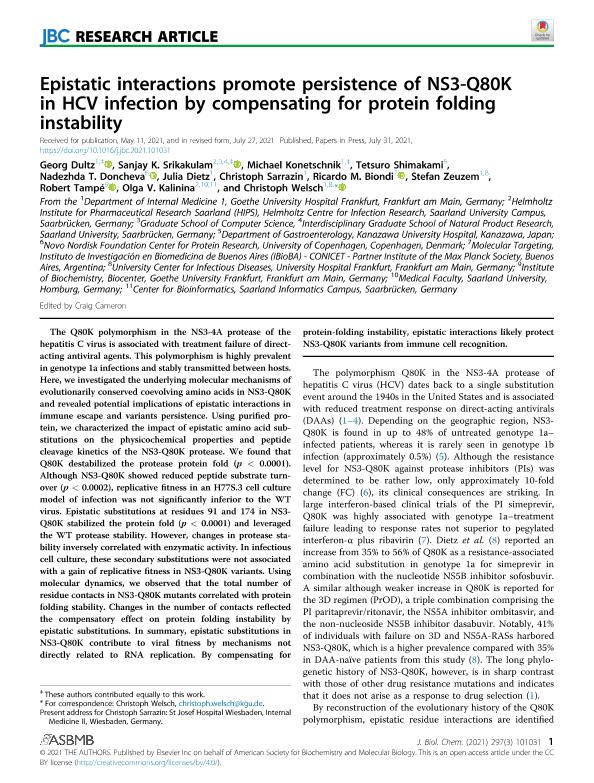Artículo
Epistatic interactions promote persistence of NS3-Q80K in HCV infection by compensating for protein folding instability
Dultz, Georg; Srikakulam, Sanjay K.; Konetschnik, Michael; Shimakami, Tetsuro; Doncheva, Nadezhda T.; Dietz, Julia; Sarrazin, Christoph; Biondi, Ricardo Miguel ; Zeuzem, Stefan; Tampé, Robert; Kalinina, Olga V.; Welsch, Christoph
; Zeuzem, Stefan; Tampé, Robert; Kalinina, Olga V.; Welsch, Christoph
 ; Zeuzem, Stefan; Tampé, Robert; Kalinina, Olga V.; Welsch, Christoph
; Zeuzem, Stefan; Tampé, Robert; Kalinina, Olga V.; Welsch, Christoph
Fecha de publicación:
09/2021
Editorial:
Elsevier
Revista:
Journal of Biological Chemistry (online)
ISSN:
0021-9258
Idioma:
Inglés
Tipo de recurso:
Artículo publicado
Clasificación temática:
Resumen
The Q80K polymorphism in the NS3-4A protease of the hepatitis C virus is associated with treatment failure of directacting antiviral agents. This polymorphism is highly prevalent in genotype 1a infections and stably transmitted between hosts. Here, we investigated the underlying molecular mechanisms of evolutionarily conserved coevolving amino acids in NS3-Q80K and revealed potential implications of epistatic interactions in immune escape and variants persistence. Using purified protein, we characterized the impact of epistatic amino acid substitutions on the physicochemical properties and peptide cleavage kinetics of the NS3-Q80K protease. We found that Q80K destabilized the protease protein fold (p < 0.0001). Although NS3-Q80K showed reduced peptide substrate turnover (p < 0.0002), replicative fitness in an H77S.3 cell culture model of infection was not significantly inferior to the WT virus. Epistatic substitutions at residues 91 and 174 in NS3- Q80K stabilized the protein fold (p < 0.0001) and leveraged the WT protease stability. However, changes in protease stability inversely correlated with enzymatic activity. In infectious cell culture, these secondary substitutions were not associated with a gain of replicative fitness in NS3-Q80K variants. Using molecular dynamics, we observed that the total number of residue contacts in NS3-Q80K mutants correlated with protein folding stability. Changes in the number of contacts reflected the compensatory effect on protein folding instability by epistatic substitutions. In summary, epistatic substitutions in NS3-Q80K contribute to viral fitness by mechanisms not directly related to RNA replication. By compensating for protein-folding instability, epistatic interactions likely protect NS3-Q80K variants from immune cell recognition.
Palabras clave:
HEPATITIS C
,
HCV
,
NS3
,
TEMPERATURE STABILITY
Archivos asociados
Licencia
Identificadores
Colecciones
Articulos(IBIOBA - MPSP)
Articulos de INST. D/INV.EN BIOMED.DE BS AS-CONICET-INST. PARTNER SOCIEDAD MAX PLANCK
Articulos de INST. D/INV.EN BIOMED.DE BS AS-CONICET-INST. PARTNER SOCIEDAD MAX PLANCK
Citación
Dultz, Georg; Srikakulam, Sanjay K.; Konetschnik, Michael; Shimakami, Tetsuro; Doncheva, Nadezhda T.; et al.; Epistatic interactions promote persistence of NS3-Q80K in HCV infection by compensating for protein folding instability; Elsevier; Journal of Biological Chemistry (online); 297; 3; 9-2021; 1-12
Compartir
Altmétricas



